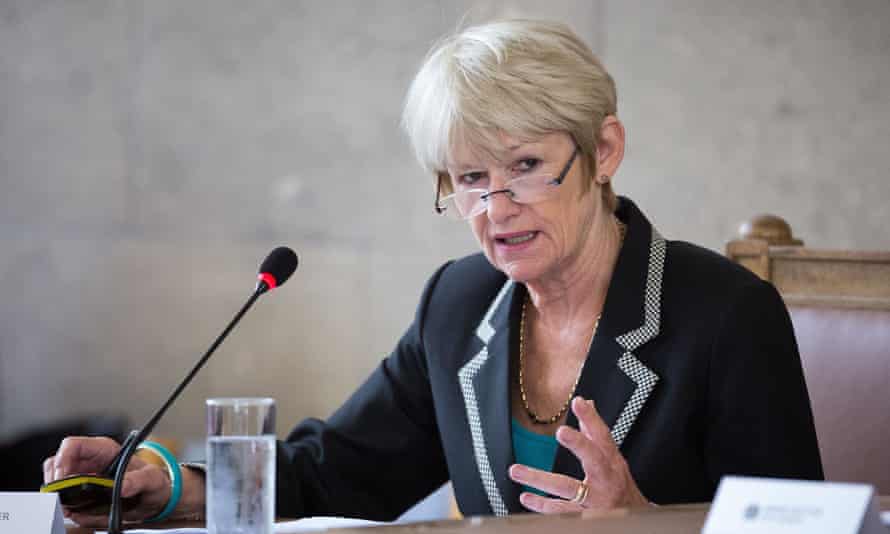Students’ union calls vote of no confidence in Nancy Rothwell over handling of Covid crisis

Nancy Rothwell. The students’ union wants a replacement vice-chancellor to be democratically elected by staff and students.
Photograph: Joel Goodman/Lnp/Rex/Shutterstock
Rachel Hall
THE GUARDIAN
Thu 11 Feb 2021
Students at Manchester University have launched a revolt against their vice-chancellor over the university’s mishandling of the coronavirus pandemic and have demanded she step down over her “complete failure of management”.
The Manchester students’ union will hold a vote of no-confidence in the vice-chancellor, Nancy Rothwell, the first time in its nearly 200-year history such a motion has been triggered. If the vote in March is successful, it will be reported to the university’s board of governors, which will decide whether to take further action.
The vote’s organisers said it was in response to a series of high-profile disasters on campus, including fences erected around halls of residence during lockdown, an alleged racial profiling incident and reports of heavy-handed policing.
Ben McGowan, one of the student organisers of the Nancy Out campaign, said: “The frequency and volume of mistakes and complete disregard for students make clear it’s not a one-off thing, it’s a complete failure of management.”
McGowan described a “tense atmosphere” on campus with groups of police officers arriving almost daily. Students believe the university is granting the police an unusually high level of access, which may breach their tenancy rights. “They’ve been conducting random flat searches without having a reason,” he said.
McGowan said students had to obtain 400 signatures to launch the referendum, which was reached within hours. If more than 50% of students vote in favour of Rothwell’s removal, the vote will move to the board of governors.
The Nancy Out campaign wants Rothwell’s replacement to be elected by staff and students, after the vice-chancellor received a vote of no-confidence from staff who are members of the University and College Union in December.
A University of Manchester spokesperson said: “We have all worked very hard to provide all our students with the best possible learning and student experience in these unprecedented and challenging circumstances. We have not got everything right, but we are committed to working closely with student representatives to address concerns and meet student needs.
“Since the start of the academic year, Greater Manchester police have been operating an initiative across the city, which has targeted reports of large gatherings both on and off university campuses. This has included responding to such reports in our Fallowfield halls of residence – many made by students – as well as in private accommodation.”
Separately, students in Cardiff University halls of residence have complained of being told there should not be more than four people at a time in communal areas including kitchens. The university said its policy was in line with Welsh government guidance, which recommends “the use of rotas” in student flatshares.

Former Tory MP in row over appointment as head of Office for Students
A university email said students had a collective responsibility for their flatmates’ behaviour, and warned: “If you fail to report a breach of the rules you will be deemed collectively responsible with those who host parties.” It further requested that students on campus obtain Covid-19 tests on a weekly basis.
Gurpal Sahota, a student in Talybont North halls, said the policy meant he and his five flatmates could not all be in the kitchen at the same time, a situation shared by lots of other students.
He said: “It just wouldn’t be fair and if one of us gets Covid we all have to isolate regardless. The university can’t expect us to police our flatmates’ behaviour.”
Another student, Tom Doe, reported “constant patrols” of private security guards throughout the day, with guards manning gates in the evening.
At Bangor University, one student complained about students arriving in halls from abroad, which he worried could result in the spread of new coronavirus variants. An email from the university’s head warden recommended that he “avoid contact with them and minimise the time you spend in shared spaces”.
In Scotland, students at the University of St Andrews have been told that face-to-face teaching will not resume for the rest of the academic year, apart from for a small number of exempt courses. As face-to-face teaching has been suspended for most students since the end of the autumn term, most will receive less than three months of on-campus learning this academic year.
Sally Mapstone, the principal of St Andrews, said: “I know that this will be a big disappointment to many students, and staff. We are acting now, however, to provide you with as much certainty as early as we can, having listened carefully to student leaders and our staff, and considered all the evidence available to us on the predicted course of the pandemic.”
Universities in Scotland typically end their term earlier than other UK institutions, meaning that others may follow St Andrews’ example. Edinburgh University said teaching would remain online until the Easter holidays, and its vice-chancellor told undergraduates there would be little or no face-to-face teaching for the rest of the year.
Rachel Hall
THE GUARDIAN
Thu 11 Feb 2021
Students at Manchester University have launched a revolt against their vice-chancellor over the university’s mishandling of the coronavirus pandemic and have demanded she step down over her “complete failure of management”.
The Manchester students’ union will hold a vote of no-confidence in the vice-chancellor, Nancy Rothwell, the first time in its nearly 200-year history such a motion has been triggered. If the vote in March is successful, it will be reported to the university’s board of governors, which will decide whether to take further action.
The vote’s organisers said it was in response to a series of high-profile disasters on campus, including fences erected around halls of residence during lockdown, an alleged racial profiling incident and reports of heavy-handed policing.
Ben McGowan, one of the student organisers of the Nancy Out campaign, said: “The frequency and volume of mistakes and complete disregard for students make clear it’s not a one-off thing, it’s a complete failure of management.”
McGowan described a “tense atmosphere” on campus with groups of police officers arriving almost daily. Students believe the university is granting the police an unusually high level of access, which may breach their tenancy rights. “They’ve been conducting random flat searches without having a reason,” he said.
McGowan said students had to obtain 400 signatures to launch the referendum, which was reached within hours. If more than 50% of students vote in favour of Rothwell’s removal, the vote will move to the board of governors.
The Nancy Out campaign wants Rothwell’s replacement to be elected by staff and students, after the vice-chancellor received a vote of no-confidence from staff who are members of the University and College Union in December.
A University of Manchester spokesperson said: “We have all worked very hard to provide all our students with the best possible learning and student experience in these unprecedented and challenging circumstances. We have not got everything right, but we are committed to working closely with student representatives to address concerns and meet student needs.
“Since the start of the academic year, Greater Manchester police have been operating an initiative across the city, which has targeted reports of large gatherings both on and off university campuses. This has included responding to such reports in our Fallowfield halls of residence – many made by students – as well as in private accommodation.”
Separately, students in Cardiff University halls of residence have complained of being told there should not be more than four people at a time in communal areas including kitchens. The university said its policy was in line with Welsh government guidance, which recommends “the use of rotas” in student flatshares.

Former Tory MP in row over appointment as head of Office for Students
A university email said students had a collective responsibility for their flatmates’ behaviour, and warned: “If you fail to report a breach of the rules you will be deemed collectively responsible with those who host parties.” It further requested that students on campus obtain Covid-19 tests on a weekly basis.
Gurpal Sahota, a student in Talybont North halls, said the policy meant he and his five flatmates could not all be in the kitchen at the same time, a situation shared by lots of other students.
He said: “It just wouldn’t be fair and if one of us gets Covid we all have to isolate regardless. The university can’t expect us to police our flatmates’ behaviour.”
Another student, Tom Doe, reported “constant patrols” of private security guards throughout the day, with guards manning gates in the evening.
At Bangor University, one student complained about students arriving in halls from abroad, which he worried could result in the spread of new coronavirus variants. An email from the university’s head warden recommended that he “avoid contact with them and minimise the time you spend in shared spaces”.
In Scotland, students at the University of St Andrews have been told that face-to-face teaching will not resume for the rest of the academic year, apart from for a small number of exempt courses. As face-to-face teaching has been suspended for most students since the end of the autumn term, most will receive less than three months of on-campus learning this academic year.
Sally Mapstone, the principal of St Andrews, said: “I know that this will be a big disappointment to many students, and staff. We are acting now, however, to provide you with as much certainty as early as we can, having listened carefully to student leaders and our staff, and considered all the evidence available to us on the predicted course of the pandemic.”
Universities in Scotland typically end their term earlier than other UK institutions, meaning that others may follow St Andrews’ example. Edinburgh University said teaching would remain online until the Easter holidays, and its vice-chancellor told undergraduates there would be little or no face-to-face teaching for the rest of the year.
No comments:
Post a Comment